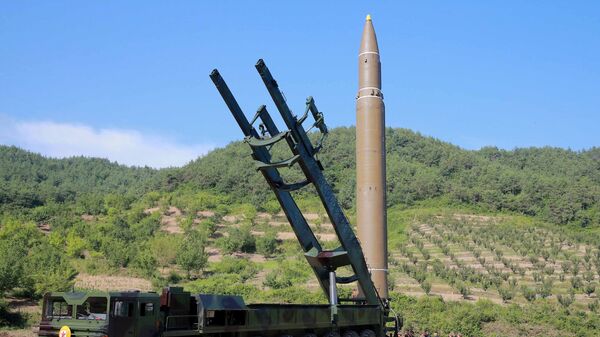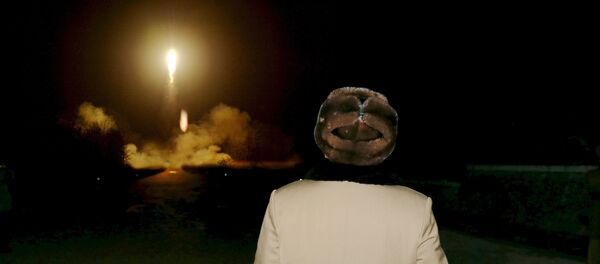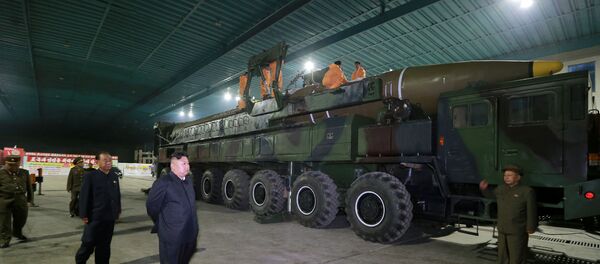On July 4 North Korea announced that it had successfully launched its first intercontinental ballistic missile, the Hwasong-14, at 00:30 GMT.
In response, Russia and China called upon Pyongyang to declare a moratorium on nuclear tests and simultaneously urged Washington and Seoul to refrain from holding joint drills in the region.
"The sides suggest for North Korea, as a way of voluntary political settlement, to declare a moratorium on tests of nuclear explosive devices and test launches of ballistic missiles and for the United States and South Korea to refrain from carrying out large-scale joint exercises," the joint statement said.
What is ironic about the event is that it coincided with America's Independence Day, Khrolenko noted. Actually North Korea has demonstrated that it wouldn't bend to US nuclear threats.
"According to DPRK media, the intercontinental ballistic missile (ICBM) Hwaseong-14, launched [Tuesday] from the western coast of the country, reached an altitude of 2,802 kilometers and fell into the sea at a distance of 933 kilometers from the launch point. The flight lasted for 39 minutes and demonstrated [the country's] technological capabilities which allow the DPRK to have an ICBM with a striking range of about 10,000 kilometers," Khrolenko wrote.
In addition, Pyongyang tested the medium-range ballistic solid-fuel missile Pukykson-2 in late May 2017.
"Judging from this series of tests, North Korea has more than one trump card up its sleeve," Khrolenko noted.
Moreover, citing South Korean observers the journalist suggested that Pyongyang's ICBMs are already capable of reaching the territory of the US: experts determine the range of an intercontinental ballistic missile by multiplying its maximum flight altitudes by four.
Predictably, North Korea's missile tests have triggered a storm of criticism from Washington.
North Korea has just launched another missile. Does this guy have anything better to do with his life? Hard to believe that South Korea…..
— Donald J. Trump (@realDonaldTrump) 4 июля 2017 г.
….and Japan will put up with this much longer. Perhaps China will put a heavy move on North Korea and end this nonsense once and for all!
— Donald J. Trump (@realDonaldTrump) 4 июля 2017 г.
"North Korea has just launched another missile. Does this guy have anything better to do with his life? Hard to believe that South Korea… and Japan will put up with this much longer. Perhaps China will put a heavy move on North Korea and end this nonsense once and for all!" Trump tweeted following Pyongyang's most recent test.
"Perhaps, in the long run, Washington will provide its Asian allies with an opportunity to independently deal with Pyongyang. Further attempts to threaten the DPRK look absolutely futile," the journalist underscored.
"North Korean nuclear weapons remain an unavoidable threat to the United States and its allies," he added.
Khrolenko suggested that in this context South Korea, Japan and the United States should "soberly assess the military capabilities of the DPRK, draw conclusions, shorten the schedule of US-South Korean maneuvers, and change their [outdated] rhetoric belonging to the middle of the last century."
Meanwhile, the militarization of the Korean Peninsula undermines the geopolitical stability of the entire East Asian region.
That means that the peace is hanging in the balance in the region.
However, it can't be denied that Washington bears responsibility for the tension simmering over the Korean Peninsula, Khrolenko noted, referring to the fact that the US has yet to strike a peace agreement with North Korea. Although the Korean War (1950-53) ended more than half a century ago, the US is still technically at war with Pyongyang.
In addition, Washington has repeatedly rejected Pyongyang's peace initiatives and the very idea of concluding a peace treaty.
While the US may not like the DPRK nuclear missile program it is not enough to declare the North Korean leadership the enemy of peace and America's independence, the journalist believes.
On the other hand, China and Russia warn the US against escalating tensions in the region.
США не будут отменять военные учения у Корейского п-ва. У Буша-мл. был Ирак, у Обамы —Ливия. Трамп рискует получить свою войну — корейскую.
— Алексей Пушков (@Alexey_Pushkov) 5 июля 2017 г.
"The US won't cancel military exercises near the Korean peninsula. Bush Jr. had Iraq, Obama had Libya. Trump is risking having a war of his own — the Korean one," Alexey Pushkov, a member of the Russian parliament's defense committee, tweeted.




